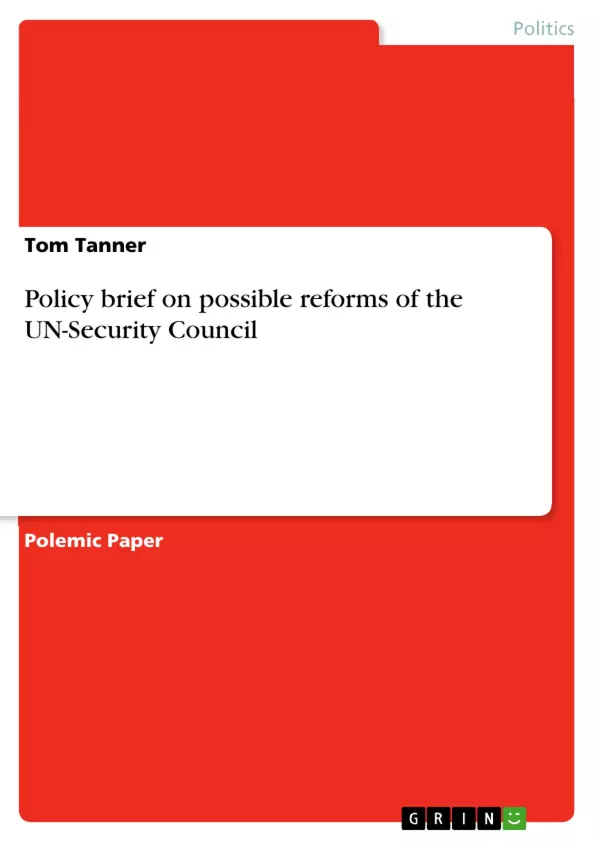The United Nations Security council is a system with some deep implemented problems. Most important are the unproportionate representation of the United Nation’s members and the inequality of voting power of its permanent members. It is of every, but those five permanent members interest that these flaws are fixed. This paper elaborates three different approaches to do so for Austria.
First, the removal of the permanent member status or at least its right to veto resolutions. Second, the withdrawal from the United Nations while forming a new supranational organisation. And last, the option to bide for a better opportunity to implement one of the other policies and to avoid negative consequences. There are positive as well as negative consequences to each of those policies which are discussed separately. Secluding this policy brief will come to the conclusion that the formal proposal is the best option for Austria at the moment.
Inhaltsverzeichnis (Table of Contents)
- Introduction
- Statement of Issue
- Options
- Abolition of the P5
- Withdrawal from the UNO
- Bide
- Summary
- Bibliography
Zielsetzung und Themenschwerpunkte (Objectives and Key Themes)
This policy brief explores the possibility of reforms for the United Nations Security Council (UNSC), focusing on the challenges posed by the veto power of permanent members and the disproportionate representation of states within the council. It examines three potential options for Austria: abolishing permanent membership or the veto right, withdrawing from the United Nations, and adopting a wait-and-see approach.
- The need for UNSC reform
- The consequences of the veto power
- The implications of unequal representation within the UNSC
- Potential options for Austria's involvement in UNSC reform
- The feasibility and impact of each option
Zusammenfassung der Kapitel (Chapter Summaries)
- Introduction: This chapter provides an overview of the history and challenges facing the United Nations, particularly the UNSC's structure and the role of permanent members. It highlights the issues of veto power and disproportionate representation, setting the stage for the policy brief's focus on potential reforms.
- Statement of Issue: This chapter delves into the two main issues concerning the UNSC's operation: the veto power and the unequal representation of states. It argues that the veto system has created an oligarchical system where permanent members hold disproportionate power, potentially hindering the council's effectiveness in maintaining international peace and security. This chapter further discusses the implications of the current structure on the UN Charter's principles of sovereign equality and the potential for conflict escalation.
- Options: This chapter explores three potential options for Austria regarding its position within the UNSC: abolishing permanent membership or the veto right, withdrawing from the United Nations, and adopting a wait-and-see approach. It examines the pros and cons of each option, highlighting the potential for symbolic change, the challenges of implementing reforms, and the risks associated with leaving the international organization.
Schlüsselwörter (Keywords)
The central themes and concepts explored in this policy brief revolve around the United Nations, the UNSC, its reform, and Austria's role in these processes. It examines issues related to the veto power, disproportionate representation, and the challenges of international peace and security in the context of the UNSC's structure.
- Quote paper
- Tom Tanner (Author), 2018, Policy brief on possible reforms of the UN-Security Council, Munich, GRIN Verlag, https://www.hausarbeiten.de/document/432452


